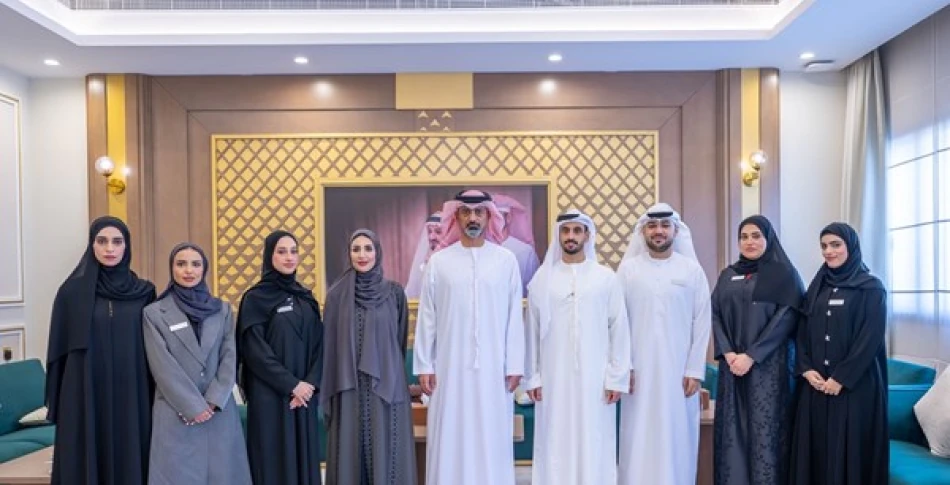
عمار النعيمي يستقبل مجلس عجمان للشباب ويطلع على خطته الاستراتيجية
Ajman Crown Prince Positions Youth as Strategic Engine for UAE's Economic Future
In a significant demonstration of the UAE's commitment to youth empowerment, Crown Prince Sheikh Ammar bin Humaid Al Nuaimi of Ajman has declared young people the "driving force for building the future," announcing comprehensive support for the newly formed seventh session of Ajman Youth Council. This strategic positioning reflects the UAE's broader vision to leverage its demographic dividend as the nation pursues economic diversification and global competitiveness through 2071.
Youth-Centric Governance Takes Center Stage
During the official reception of the Ajman Youth Council's 2025-2027 session members at the Ruler's Court, Crown Prince Sheikh Ammar emphasized that youth inclusion in development processes represents "a strategic choice with no alternative." This declarative stance signals a fundamental shift toward participatory governance models that are increasingly common among Gulf states seeking to harness young talent for economic transformation.
The Crown Prince's commitment extends beyond ceremonial support, with concrete pledges to provide necessary resources for converting youth initiatives into community-serving projects that enhance national competitiveness. This approach mirrors successful youth engagement strategies seen in Singapore and South Korea, where government-backed youth councils have contributed significantly to innovation ecosystems.
Strategic Alignment with National Vision
The newly announced strategic plan for Ajman's Youth Council demonstrates sophisticated policy coordination, aligning with three critical frameworks: the National Youth Agenda 2031, Ajman Vision 2030, and UAE Vision 2071. This multi-layered approach suggests that local youth initiatives will serve as testing grounds for scaled national programs.
Decision-Making Integration
Particularly noteworthy is the emphasis on integrating youth voices into actual decision-making processes rather than limiting their role to advisory functions. This represents a maturation of youth policy in the UAE, moving beyond symbolic participation toward substantive influence on development planning.
Economic Implications for Regional Competition
From an economic perspective, this youth-focused strategy positions Ajman to compete more effectively with regional hubs like Dubai and Abu Dhabi for talent retention and innovation leadership. By empowering local youth councils with real authority and resources, smaller emirates can differentiate themselves in the UAE's internal competition for human capital.
The timing is strategic: as the UAE prepares for a post-oil economy, investing in youth capabilities becomes essential for maintaining the nation's position as a regional business hub. This approach has proven successful in other resource-rich nations transitioning to knowledge economies, particularly Norway and Canada.
New Leadership Structure Signals Continuity
The announcement of the council's new composition, led by Chairman Abdullah Al Rumaiti and Vice-Chairman Amna Al Shahi, includes representation from the UAE Youth Council, ensuring coordination between local and federal youth initiatives. This structural integration prevents policy fragmentation and maximizes resource efficiency.
The diverse membership, spanning traditional Emirati families and representing various sectors, reflects the UAE's commitment to inclusive governance while maintaining cultural authenticity—a balance that many rapidly developing nations struggle to achieve.
Innovation Culture as Competitive Advantage
Crown Prince Sheikh Ammar's directive to "enhance innovation culture" through teamwork represents more than motivational rhetoric. In the context of the UAE's broader economic strategy, this translates to creating conditions where young entrepreneurs can develop solutions for both local challenges and global markets.
This focus on innovation culture positions Ajman within the UAE's larger ecosystem of business-friendly policies, potentially attracting international investors seeking partnerships with emerging Emirati talent. The approach has parallels with Israel's successful integration of military innovation programs with civilian entrepreneurship, though adapted to the UAE's distinct cultural and economic context.
Most Viewed News

 Layla Al Mansoori
Layla Al Mansoori






